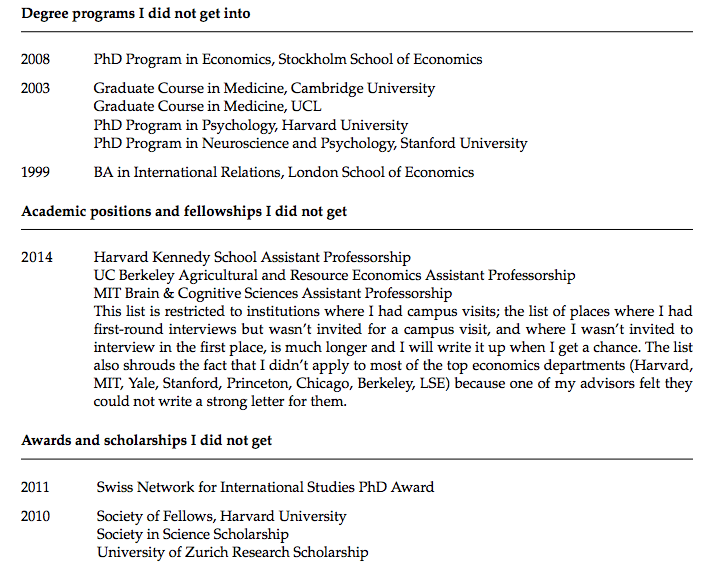Let the wild schadenfreude (pleasure derived from the misfortunes of others) rumpus begin!
Professor Johannes Haushofer, who teaches psychology and public affairs at Princeton, recently published a CV documenting every failure in his career to date. He listed the jobs he failed to land. The papers that never got published. The fellowships that went to someone else. The university programs he did not get into. This “CV of failures” was a Twitter sensation and was picked up by newspapers globally. It was so popular that the good professor complained that it was a “meta failure” as it attracted far more attention than his entire academic achievements combined! You will see his failures listed below this article.
He confesses he’s not the first academic to publish his failures; he cites a few others who have. And credits Professor Melanie Stefan of the University of Edinburgh for the idea, first published in the journal Nature in 2010. “As scientists, we construct a narrative of success that renders our setbacks invisible both to ourselves and to others,” she writes. “Often, other scientists’ careers seem to be a constant, streamlined series of triumphs. Therefore, whenever we experience an individual failure, we feel alone and dejected.”
She recommends we keep a CV of failures, to remind ourselves that failure is an essential part of what it means to be successful, and possibly inspire a disheartened colleague or friend along the way. Prof. Stefan also mentions that academic fellowships have a success rate of about 15 percent – meaning that for every hour spent writing a successful application, she probably spent six hours for nothing.
And as you will see below, a rejection can save your life.
How can this help me?
- Self-awareness. We are not saying failures are are important as successes! However, self-awareness is an important component of Emotional Intelligence (EI). We have been looking at CVs of our accomplishments for years, that ignores the bulk of our efforts. Having a better awareness of our past successes and failures could improve our self-awareness, EI, future success and performance.
- Taking Enough Risk. Also, noting the frequency of our failures has something to do with whether we are taking enough risks. While you can expect that frequency to go down after age 35, as you change jobs less frequently, it is important to see how often you’re putting yourself out there. If you’re not taking a chance to fail, you’re not taking a chance to succeed.
- True Grit. You will marvel at how resilient you have been and can inspire others on how to weather setbacks.
- New Opportunities. As you look at all the organizations that rejected you, you might reconnect with a recruiter who now, impressed with what you have done since then, has something better in store for you.
- Blessings in Disguise. If nothing else, it will be an interesting trip down memory lane, and you can feel thankful for all those paths you did not go down, and are now blessed with the friends and family you have! One of my first rejections after college was in 1998, at Sandler O’Neill, a financial services company. It was on the 104th floor of the World Trade Center in Manhattan; the view from its conference room was spectacular, with all of Manhattan at your feet. Sixty-six of its employees perished on September 11. It’s hard to even call that serendipitous rejection a failure. The long view matters, and failure is very subjective.
Professor Haushofer’s own CV of Failures

CV of Failures Page 1

CV of Failures Page 2
About The Author
Our Career Services
CAREER CHOICE AND CHANGE
Find out which jobs suit you best, using career tests for your personality, interests, skills, values and goals.
TRANSITION AND JOB SEARCH
Conduct a quick and effective job search in Singapore. Optimise your resume, cover letters, job search techniques and interviews.
WELL-BEING AND ADVANCEMENT
Use career coaching to advance your career and increase your earnings, by improving your effectiveness in the workplace.
QUICK CAREER Q&A
Have a quick discussion with a career counsellor, to speak about and resolve any situation or issue you are facing at work.
